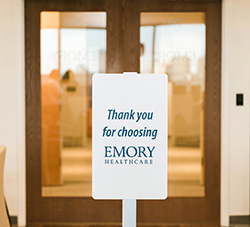Health for the Whole Woman: Make the Most of Your Yearly Visit

Written by: Kalinda Woods, MD, Assistant Professor, Department of Gynecology and Obstetrics, General Ob/Gyn. Dr. Woods sees patients at Emory Women's Center, Emory University Hospital.
A GYN/OB cares for women through adolescence, pregnancy, the reproductive years, menopause and beyond. Although our subject area is specific - women’s health - our knowledge base and training are vast. In fact, you may be surprised at the health problems we can spot and resolve. Below are a few tips for getting the most out of an annual exam with your GYN/OB.
Take Time to Talk
The annual visit is often the best time to talk with your GYN/OB about whatever concerns you, including:
- Your contraception. Are you happy with it? Do you want to switch? Your GYN/OB can help you decide.
- Questions about new guidelines. For instance, there are new guidelines for Pap smears, perhaps you want to know more. Your gynecologist is happy to answer your questions.
- Problems with sexual drive or desire. We can help with this, too.
- Your plans to start a family in the next 1-2 years. Please let your GYN/OB know now, so you can work together to get your body and mind ready for a healthy pregnancy.
- Going through the menopausal transition. You may have a lot of questions. Your doctor has the answers.
Whether you have questions or a health problem, your GYN/OB can help.
Be Ready to Give Medical History and Updates
Let’s say about six months before your annual gynecology visit your primary care doctor started you on medicine to treat high blood pressure. You should let your GYN/OB know this, especially if you are planning to become pregnant. Be sure to have the name of your medicine and the dosage handy, as there are certain medicines which will need to be changed if they are not safe with pregnancy. Likewise, if you have had any surgeries or new medicines of any type, or if you have stayed in the hospital since your last office visit, your doctor needs to know.
Most general GYN/OB doctors also perform gynecologic surgery. Because of this, tell your GYN/OB what operations you have had so your medical chart can be updated. Also, based on the information you provide, your contraception might need to be changed, or your current method may no longer be as safe. Your doctor may also suggest a better birth control method to help treat a new health problem.
It’s important for you to ask questions and talk about your health! Your GYN/OB is interested in caring for the whole body.
Know Your Family’s Health History

Your family history of disease can affect your health and how your health problems are managed. For instance, if there is a strong history of certain cancers, your doctor may recommend early screening for diseases like breast or colorectal cancers. If some of your family members have had early deaths from heart disease, this is important information because it can affect contraceptive choices, pregnancy planning, managing menopausal symptoms and more.
The smallest details matter, so try to talk to your family members about their histories if you can. The best relatives to talk with are called “first degree” relatives, such as parents and siblings. They are the most like you when it comes to family genes.
Share Your Social History
Perhaps you have a fibroid uterus, but if your job involves lifting and bending, your back pain may be from musculoskeletal strain. Your job is part of your “social history,” which is information that gives your doctor a valuable glimpse into your day-to-day life. Your GYN/OB may want to know such things as:
- Where you work
- How you get to work each day
- If you have any habits you’re trying to break, such as smoking
- Who lives in your household, and what those relationships are like
- If you feel safe at home and at work or school
Information like this offers clues to whatever is ailing you, so your doctor can take care of the whole person. Honesty is important here, and you can trust that the exam room is your safe haven. There’s very little you can say that would shock your doctor. Everything you share is confidential and cannot be given to third parties without your consent.
Make the Most of Your Visit
Your GYN/OB can help you maintain good health and healthy habits for life. To make the most of your yearly visit, engage with your GYN/OB so she or he will learn more about the best ways to help you: be prepared with your health history, be honest and be ready to answer questions like those mentioned above.





